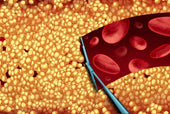When we think about a healthy diet, we usually think about vitamins, minerals or sufficient protein intake. However, in fact, one of the most important keys to well-being is hidden in simple, everyday choices. Fiber is like an invisible hero in our diet, which we remember only when we want to lose a few kilograms and slim down. However, it is not only a weight loss helper - its role is much broader and more important than it seems at first glance. Fiber quietly does its job every day, but it is precisely it that can determine whether we feel light, energetic and ready for the challenges of the day. Even more importantly, it is not only needed by adults - fiber is essential from childhood, because its role in the life of a growing organism is much greater than many imagine.
More significant than it seems
Fiber is often called the natural intestinal brush. As it travels through the digestive tract, it cleans, organizes, and ensures the harmonious functioning of our body. When there is enough of it, the digestive system works perfectly, bowel movements become regular, the unpleasant feeling of heaviness in the stomach disappears, and the feeling of satiety after eating remains for a longer time. It also acts as food for good bacteria, which are the true allies of our immunity. Without it, the immune system weakens, and the body becomes less resistant to diseases. So, although fiber may seem insignificant to many at first glance, it silently forms the entire foundation of our health.
"Fiber is important not only for digestion - it forms a healthy intestinal microbiota, which is involved in the activity of immunity, the regulation of inflammatory and allergic processes, the support of cognitive functions and psychological processes, and can also influence the course of autoimmune diseases. A healthy microbiota synthesizes certain vitamins and numerous bioactive metabolites. Of particular importance are short-chain fatty acids, which are produced by good bacteria in the intestine by fermenting soluble fibers. These substances reach various body systems through the bloodstream and have a significant positive effect on the optimal functioning of the body, such as the functioning of internal organs, metabolism, hormone balance, energy production, and nervous system functions. Thus, sufficient daily fiber consumption is related not only to the prevention and management of chronic diseases in the long term, but also to a positive effect in everyday life - an optimally functioning digestive system, more effective immune protection against infections, better emotional well-being, sleep quality, and even the maintenance of cognitive functions," he says. Lifestyle medicine specialist, medical oncologist and chemotherapist Lina Paulauskienė.
It also affects the condition of the skin
As Rasa Rimšė, a cosmetologist and lifestyle medicine specialist at Effectus Clinic, adds, skin health is also directly related to the microbiota, which is important not only for the condition of the intestines, but also for the condition of the skin. The microbiota regulates skin moisture and pH, reduces inflammatory processes, and strengthens the natural skin barrier.
"The gut and skin are closely connected due to mutual communication and complex mechanisms, such as immune system activity and inflammatory processes. When the normal balance of the intestinal microbiota is disrupted, skin problems such as acne, rosacea, eczema, psoriasis and other skin diseases can appear or worsen. It is important to emphasize that a balanced diet has a significant impact on the health of the intestinal microbiota, and at the same time - on the skin. You should include fermented products rich in probiotics in your diet, such as kefir, kefir, sauerkraut or cucumbers, yogurt, as well as goat and sheep cheese," says R. Rimšė.
Fiber – the support of a growing organism
Fiber is often thought of as a concern for adults. However, it is also extremely important for children, who often experience digestive disorders or simply do not get enough fruits, vegetables and whole grains. It supports the smooth functioning of the digestive system and helps prevent constipation, which is one of the most common health problems in children. When a child's body gets enough fiber, bloating disappears, and the little one feels lighter and more relaxed. Since fiber feeds the good intestinal bacteria, which are closely linked to immunity, this means that children who get enough fiber get sick less often, recover faster from illnesses and have more energy for daily challenges.
"Fiber is one of the most important nutritional components that helps maintain optimal health from an early age. Its significant effects are relevant for both adults and children. Scientific research shows that a sufficient amount of fiber not only supports regular bowel movements and intestinal health, but also helps regulate cholesterol and blood glucose levels, thereby reducing the risk of cardiovascular diseases, type 2 diabetes, obesity and other chronic diseases," says lifestyle medicine specialist L. Paulauskienė.
A healthy child is an energetic child.
Every parent knows that a child needs a lot of strength: in kindergarten or school - concentration and memory, in training - endurance and physical strength, in games - inexhaustible energy and creativity. Children grow quickly, their body works in an intensive mode, so the need for energy is constant. This is where fiber plays a much more important role than we often imagine. They help to absorb carbohydrates more slowly, so blood sugar levels rise and fall evenly, without leaving sudden energy spikes or dips. Instead of a short-term “sugar bomb” from sweets, the child gets a more constant source of energy, which allows them to stay focused in class longer, not get distracted during training, or simply have fun playing in the yard without getting tired.
Importantly, fiber also helps prevent constant hunger, reducing the need to snack on sweets or fast food. In other words, it creates a solid energy foundation that allows a child to grow, learn, and move the way they need to every day.
Only a third of the recommended intake is consumed
Fiber needs vary depending on age and gender. The World Health Organization (WHO) recommends that the youngest children aged 1–3 years consume about 14 grams of fiber per day. This need increases as they grow: children aged 4–8 years should consume about 20 grams, and children aged 9–13 years – about 25 grams of fiber. From the age of 14, the recommendations approach the adult norm – girls and women are advised to consume about 26 grams, and boys and men – even about 38 grams of fiber per day. It is also important to remember that it is recommended to adhere to a 2:1 ratio of insoluble to soluble fiber.
Unfortunately, the reality is that the diet of many children and adults does not provide enough fiber - they get almost half the recommended amount. On average, in Lithuania, only a third of the recommended fiber intake is consumed. Lack of fiber leads to bloating, lack of energy, feeling tired, heavy, and in a bad mood.
Fiber sources
To get enough fiber, it is important to include a variety of sources in your diet – grains, legumes, fruits, and, if necessary, additional forms of fiber. You can choose whole-grain porridge or whole-grain sandwiches for breakfast, vegetable soups or legumes for lunch, and fruit or nuts for snacks.
"We can only get fiber from complete plant-based products - vegetables, nuts, seeds, legumes, whole grains, fruits, berries. Meanwhile, animal products do not contain fiber, and there is almost no fiber left in highly processed plant-based foods. I recommend including vegetables in every meal, eating several fruits or a handful of berries every day, choosing nuts for snacks, sprinkling seeds on dishes, choosing whole grain products instead of refined ones, and including legumes in the diet at least several times a week. Such simple but consistently applied solutions help ensure a sufficient amount of fiber in the diet of both children and adults and, in the long run, become a strong foundation for health," says doctor L. Paulauskienė.
It is important to remember that the priority should be fiber obtained with food, but sometimes, especially with picky little eaters, collecting the required daily fiber intake becomes a real challenge. In such cases, " fruttberry +fiber " fibers can come to the rescue for parents. They can be easily mixed into yogurt, smoothies or even children's favorite porridge. They do not change the taste, but they give the child's body what it really needs - additional fiber, which ensures energy, strong immunity and smooth digestion.
The basis of everyday health
It is very important to form healthy habits from an early age - this way the child will not only grow stronger, but will also learn to be friends with food, which will become a guarantee of his health in the future. By ensuring that the child gets enough fiber from an early age, many problems can be avoided in the future: obesity, digestive disorders, heart or metabolic diseases. A simple daily habit - fiber consumption - can become an invaluable investment in the child's health, energy and well-being.






















